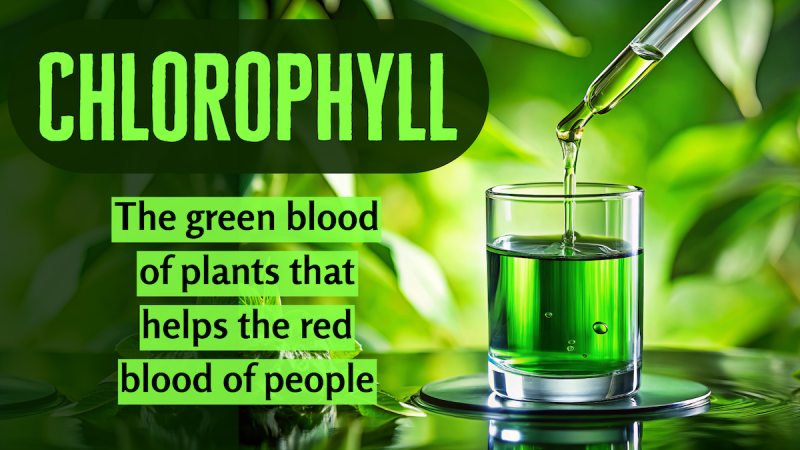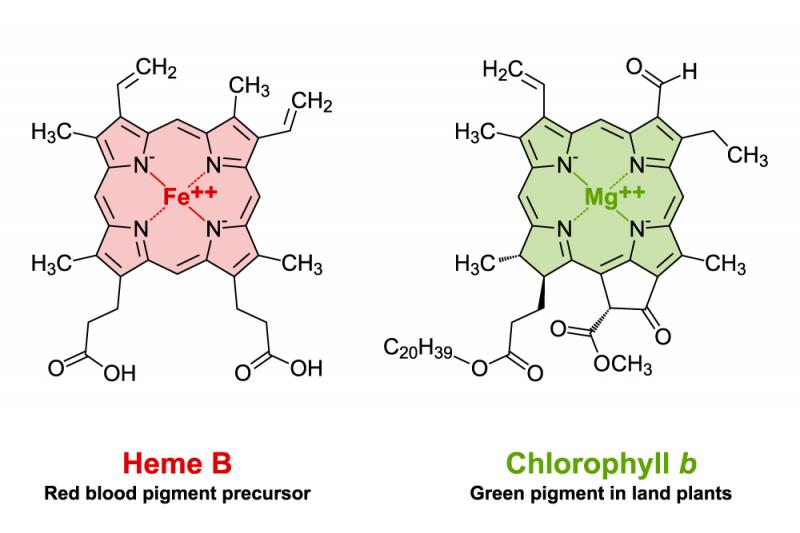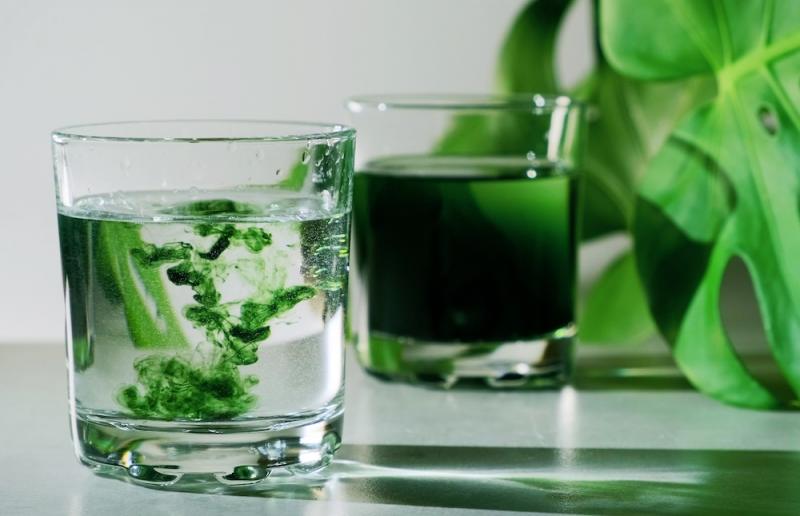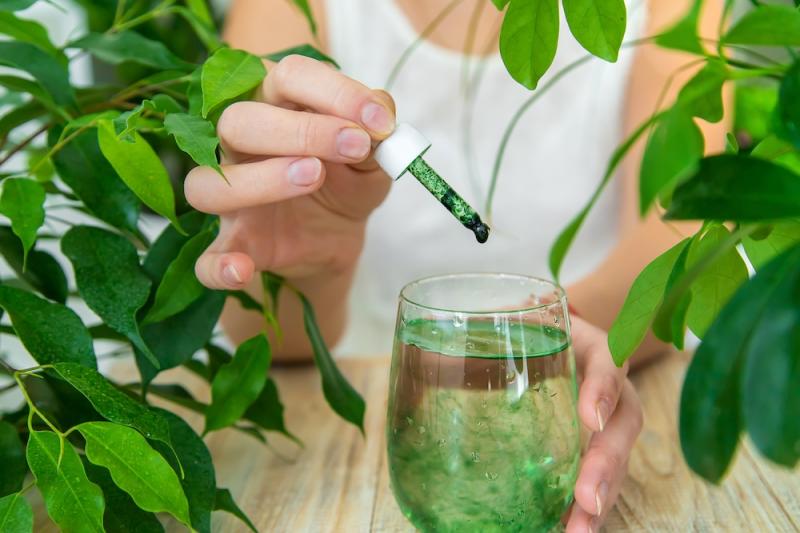
The green color associated with plants is due to the presence of chlorophyll, an amazing substance that makes life on planet earth possible. Chlorophyll makes it possible for plants to capture light energy from the sun to produce carbohydrates, the basic energy source for people and animals.
Chlorophyll is one of the reasons we’re often advised to eat green leafy vegetables for good health. Chlorophyll-rich, green leafy vegetables contain many minerals needed to build strong tissues, especially magnesium. The chlorophyll molecule is based on the mineral magnesium, a nutrient many people lack.
In addition to being a valuable source of magnesium and other minerals, chlorophyll has many positive health benefits.
Chlorophyll and the Blood
 Chlorophyll has been called the green blood of plants and has been likened to hemoglobin which provides the red color of human and animal blood. Chlorophyll appears to positively influence the health of the blood. It reduces agglutination (stickiness which causes the clumping of red blood cells). This reduces the tendency to clotting while increasing oxygen uptake in the blood. It is also part of the reason chlorophyll is alkalizing. In my experience, chlorophyll contributes to healthier blood and may be helpful in anemia but the mechanisms for this are not fully known. It may have something to do with aiding hemoglobin production, but I haven’t found any solid evidence to back this up.
Chlorophyll has been called the green blood of plants and has been likened to hemoglobin which provides the red color of human and animal blood. Chlorophyll appears to positively influence the health of the blood. It reduces agglutination (stickiness which causes the clumping of red blood cells). This reduces the tendency to clotting while increasing oxygen uptake in the blood. It is also part of the reason chlorophyll is alkalizing. In my experience, chlorophyll contributes to healthier blood and may be helpful in anemia but the mechanisms for this are not fully known. It may have something to do with aiding hemoglobin production, but I haven’t found any solid evidence to back this up.
This also makes chlorophyll energizing. I’ve seen it perk up someone who is tired and pale in a matter of minutes. Someone once shared with me how she used liquid chlorophyll to help her father in the hospital, who was suffering from lung problems and low oxygen. She claimed that the oxygen levels in his blood would rise very rapidly after using chlorophyll.
Chlorophyll and Detoxification
 In 1994, The American Association for Cancer Research found that chlorophyll has the capability to ward off cancer-causing agents within the body. Some of the carcinogens chlorophyll has the ability to combat include benzopyrene (associated with tobacco smoke) and certain carbamates (elements found in insecticides that result in convulsions and death in lab rats). Upon oral administration of chlorophyll, there was a significant drop in the incidence of cancerous growths.
In 1994, The American Association for Cancer Research found that chlorophyll has the capability to ward off cancer-causing agents within the body. Some of the carcinogens chlorophyll has the ability to combat include benzopyrene (associated with tobacco smoke) and certain carbamates (elements found in insecticides that result in convulsions and death in lab rats). Upon oral administration of chlorophyll, there was a significant drop in the incidence of cancerous growths.
Oregon State University and the University of Hawaii found that the properties of chlorophyll inhibit an amine from fried foods, an element that has been found to instigate cancers within the mammary glands and the liver in human subjects. Chlorophyll was shown to suppress the carcinogenic factor.
Other Properties of Chlorophyll
Chlorophyll has infection-fighting properties both topically and internally. It has been used in enemas to aid dysbiosis in the bowel and has a mild laxative action. It is also deodorizing. It has been used for years in nursing homes to lower the odor of fecal matter and perspiration. Chlorophyll is a good product to use when doing a cleanse as it reduces odors when detoxifying.
Chlorophyll Supplements
 The natural way to get chlorophyll is to eat raw green foods. Cooking destroys much of the chlorophyll in foods, which is why green foods often fade in color as you cook them. Natural chlorophyll is a fat-soluble substance, which is why it causes grass stains.
The natural way to get chlorophyll is to eat raw green foods. Cooking destroys much of the chlorophyll in foods, which is why green foods often fade in color as you cook them. Natural chlorophyll is a fat-soluble substance, which is why it causes grass stains.
Chlorophyll is stabilized and made water soluble for use in supplements by replacing the magnesium in the molecule with copper and adding sodium. This produces sodium copper chlorophyllin, which you can find in both liquid and powder forms. Sodium copper chlorophyllin is a good copper supplement, rather than a magnesium supplement, and has many of the same benefits as natural chlorophyll.
I've always liked liquid chlorophyll and the brand I've used is flavored with spearmint oil which can aid digestion and ease gas and bloating. However, I found the liquid messy, so I was pleased when they released stick packs of powdered chlorophyll. I've been taking it almost every day for about two months and I feel like it's helped both my circulation and energy.
Of course, the best way to get chlorophyll is to eat raw green vegetables like Swiss chard, celery, dark lettuce, spinach, collard greens, beet greens, and so forth. Dandelion leaves and other green-leafy herbs are also good sources. These can be eaten in salads or juiced as part of a smoothie. Again, the best benefits come from consuming them raw as the chlorophyll breaks down with cooking. Cooked greens are beneficial, of course, but it is easy to overcook them.
Downloads
Steven's Articles
-

-
Barberry and Healthy Personal Boundaries
A thorny shrub for fighting infections and supporting…
December
-

-
The Evidence for Berberine
A yellow alkaloid found in traditional infection-fighting…
-

-
The Sensible Use of Caffeinated Herbs
Kola nuts, guarana, and yerba mate and other herbs…
-

-
The Health Benefits and Problems with Coffee
This popular caffeinated beverage can be beneficial…
October
-

-
Understanding Caffeine & Cellular Adaptation
Preserving the power of caffeine's buzz and the…
September
-

-
Horseradish
A pungent spice for aiding protein metabolism…
-

-
Banaba or Crepe Myrtle
A beautiful tree from Southeast Asia whose leaves…
August
-

-
Monkeyflowers
Flower essences to help see ourselves more clearly…
-

-
Mariposa Lilies
Strengthening the bond between mother and child…
-

-
The Noble Bay Leaf
A common kitchen herb for aiding digestion and…
-

-
Epimedium: Horny Goat Weed
A circulatory stimulant and kidney yang tonic…
July
-

-
The Medicinal and Nutritional Benefits of Apricots
A nutritious fruit and valuable medicinal seed for coughs
-

-
Dogwoods
Asian dogwood is used to stop excessive discharge,…
June
-

-
Neem: The Village Pharmacy
A popular Ayurvedic remedy for dental and immune…
-

-
Spilanthes: The Toothache Plant
A traditional remedy for teeth and gums, as well…

